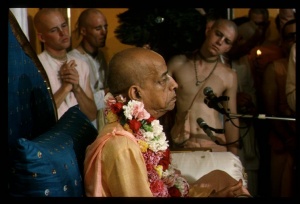SB 1.7.25 (1964): Difference between revisions
(Created page with "<div style="float:left">link=SB 1964 Seventh Chapter - The Son of Drona Punished (continued) '''[[SB 1964 Seventh Chapter - The Son of Drona Punished ...") |
(Vanibot #0020: VersionCompareLinker - added a link to the Version Compare feature) |
||
| Line 1: | Line 1: | ||
<div style="float:left">[[File:Go-previous.png|link=SB 1964 Seventh Chapter - The Son of Drona Punished (continued)]] '''[[SB 1964 Seventh Chapter - The Son of Drona Punished (continued)|SB (1964) Seventh Chapter | [[Category:Srimad-Bhagavatam (1962-1965) - Canto 01 Chapter 07]] | ||
<div style="float:left">[[File:Go-previous.png|link=SB (1964) Seventh Chapter - The Son of Drona Punished (continued)]] '''[[SB (1964) Seventh Chapter - The Son of Drona Punished (continued)|SB (1964) Seventh Chapter - The Son of Drona Punished]]'''</div> | |||
<div style="float:right">[[File:Go-previous.png|link=SB 1.7.24 (1964)]] '''[[SB 1.7.24 (1964)]] - [[SB 1.7.26 (1964)]]''' [[File:Go-next.png|link=SB 1.7.26 (1964)]]</div> | <div style="float:right">[[File:Go-previous.png|link=SB 1.7.24 (1964)]] '''[[SB 1.7.24 (1964)]] - [[SB 1.7.26 (1964)]]''' [[File:Go-next.png|link=SB 1.7.26 (1964)]]</div> | ||
{{CompareVersions|SB|1.7.25|SB 1964|SB 1972-77}} | |||
{{RandomImage}} | {{RandomImage}} | ||
| Line 6: | Line 8: | ||
==== TEXT No. 25 ==== | ==== TEXT No. 25 ==== | ||
<div | <div class="SB65verse"> | ||
Tatha aym cha avataras te bhuvo bhara jihirshaya | |||
Swanam cha ananaya bhavanam anudhyanya cha asakrit. | |||
</div> | </div> | ||
| Line 14: | Line 16: | ||
==== ENGLISH SYNONYMS ==== | ==== ENGLISH SYNONYMS ==== | ||
<div | <div class="synonyms"> | ||
Tatha—thus, Ayam—this, Cha—and, Avatara—incarnation, Te—your, Bhuvo—of the material world, Bhara—burden, ,Jihirshaya—for the matter of removing, Swanam—of the friends, Ananyabhavanam—and of the exclusive devotees, Anudhyanaya—for remembering repeatedly, Cha—and, Asakrit—fully satisfied. | Tatha—thus, Ayam—this, Cha—and, Avatara—incarnation, Te—your, Bhuvo—of the material world, Bhara—burden, ,Jihirshaya—for the matter of removing, Swanam—of the friends, Ananyabhavanam—and of the exclusive devotees, Anudhyanaya—for remembering repeatedly, Cha—and, Asakrit—fully satisfied. | ||
</div> | </div> | ||
| Line 21: | Line 23: | ||
==== TRANSLATION ==== | ==== TRANSLATION ==== | ||
<div | <div class="translation"> | ||
Thus Your descent as an incarnation is just to remove the burden of the world as well as for the benefit of Your own men and specially of those who are Your exclusive devotees, who are constantly rapt in meditation for You. | Thus Your descent as an incarnation is just to remove the burden of the world as well as for the benefit of Your own men and specially of those who are Your exclusive devotees, who are constantly rapt in meditation for You. | ||
</div> | </div> | ||
| Line 28: | Line 30: | ||
==== PURPORT ==== | ==== PURPORT ==== | ||
<div | <div class="purport"> | ||
It appears that the Lord is partial to His devotees. Everyone is related with the Lord. He is equal to everyone and yet He is more inclined to His own men and devotees. The Lord is everyone's father. Nobody can be His father and yet nobody can be his son. His devotees are His kinsmen and His devotees are His relations. This is His transcendental pastimes. It has nothing to do with mundane ideas of relations, fatherhood or anything like that. As mentioned above the Lord is above the modes of material nature and as such there is nothing mundane when we call His kinsmen and relations in devotional service. | It appears that the Lord is partial to His devotees. Everyone is related with the Lord. He is equal to everyone and yet He is more inclined to His own men and devotees. The Lord is everyone's father. Nobody can be His father and yet nobody can be his son. His devotees are His kinsmen and His devotees are His relations. This is His transcendental pastimes. It has nothing to do with mundane ideas of relations, fatherhood or anything like that. As mentioned above the Lord is above the modes of material nature and as such there is nothing mundane when we call His kinsmen and relations in devotional service. | ||
</div> | </div> | ||
| Line 36: | Line 38: | ||
<div style="float:right">[[File:Go-previous.png|link=SB 1.7.24 (1964)]] '''[[SB 1.7.24 (1964)]] - [[SB 1.7.26 (1964)]]''' [[File:Go-next.png|link=SB 1.7.26 (1964)]]</div> | <div style="float:right">[[File:Go-previous.png|link=SB 1.7.24 (1964)]] '''[[SB 1.7.24 (1964)]] - [[SB 1.7.26 (1964)]]''' [[File:Go-next.png|link=SB 1.7.26 (1964)]]</div> | ||
__NOTOC__ | __NOTOC__ | ||
__NOEDITSECTION__ | |||
Latest revision as of 11:48, 25 May 2020

A.C. Bhaktivedanta Swami Prabhupada
TEXT No. 25
Tatha aym cha avataras te bhuvo bhara jihirshaya Swanam cha ananaya bhavanam anudhyanya cha asakrit.
ENGLISH SYNONYMS
Tatha—thus, Ayam—this, Cha—and, Avatara—incarnation, Te—your, Bhuvo—of the material world, Bhara—burden, ,Jihirshaya—for the matter of removing, Swanam—of the friends, Ananyabhavanam—and of the exclusive devotees, Anudhyanaya—for remembering repeatedly, Cha—and, Asakrit—fully satisfied.
TRANSLATION
Thus Your descent as an incarnation is just to remove the burden of the world as well as for the benefit of Your own men and specially of those who are Your exclusive devotees, who are constantly rapt in meditation for You.
PURPORT
It appears that the Lord is partial to His devotees. Everyone is related with the Lord. He is equal to everyone and yet He is more inclined to His own men and devotees. The Lord is everyone's father. Nobody can be His father and yet nobody can be his son. His devotees are His kinsmen and His devotees are His relations. This is His transcendental pastimes. It has nothing to do with mundane ideas of relations, fatherhood or anything like that. As mentioned above the Lord is above the modes of material nature and as such there is nothing mundane when we call His kinsmen and relations in devotional service.